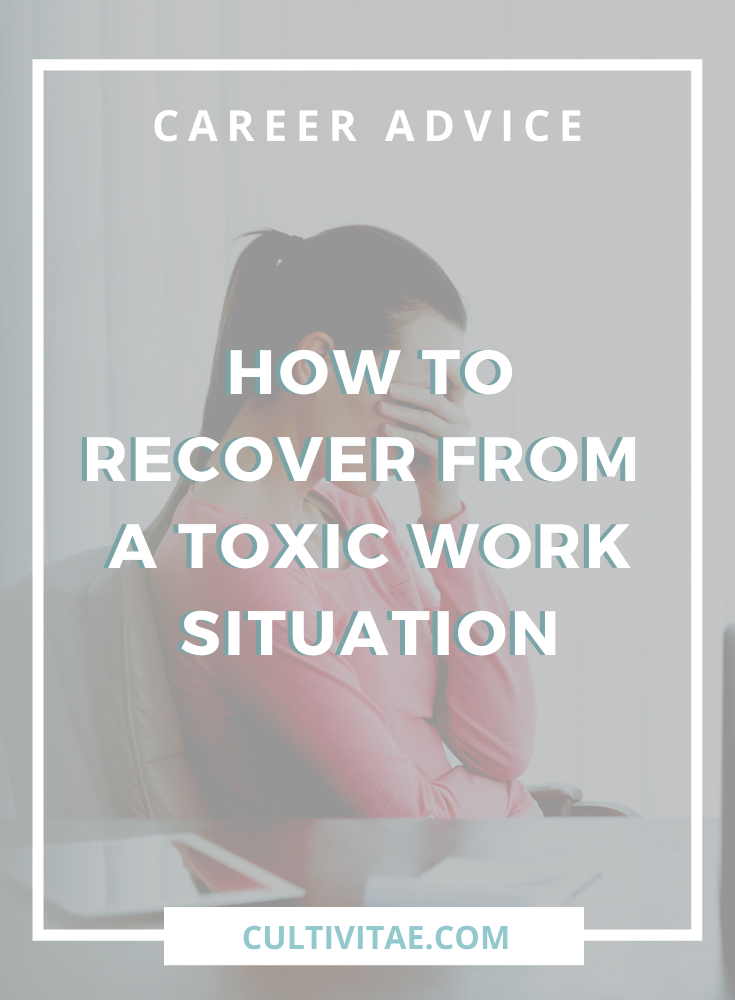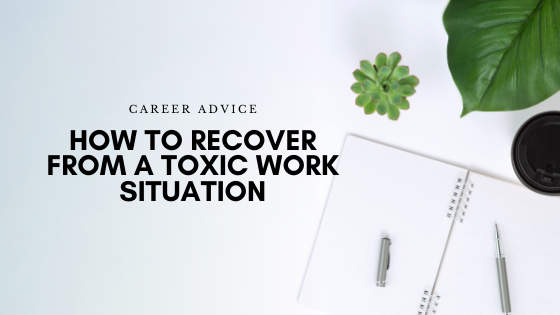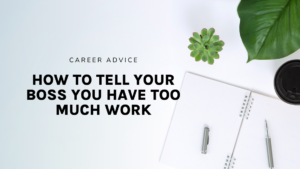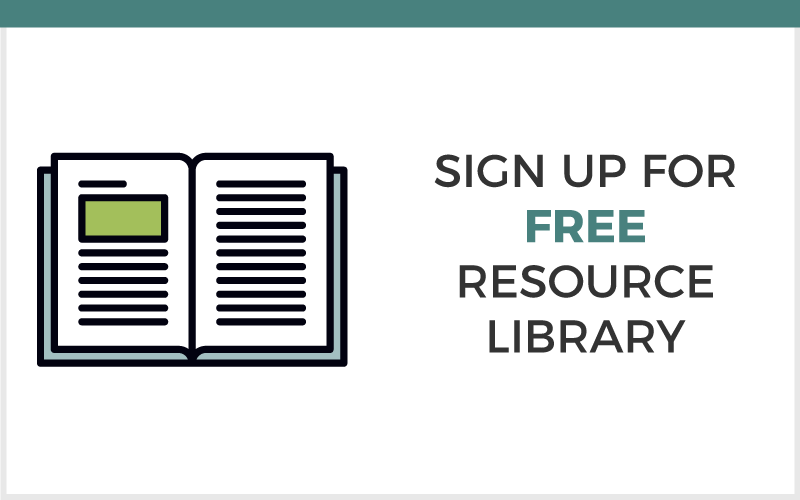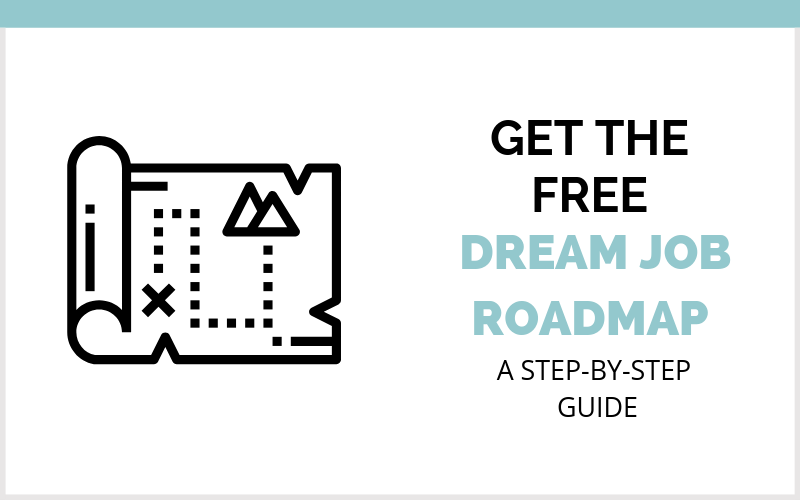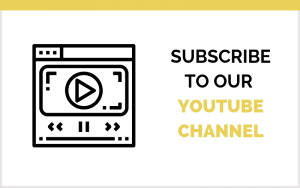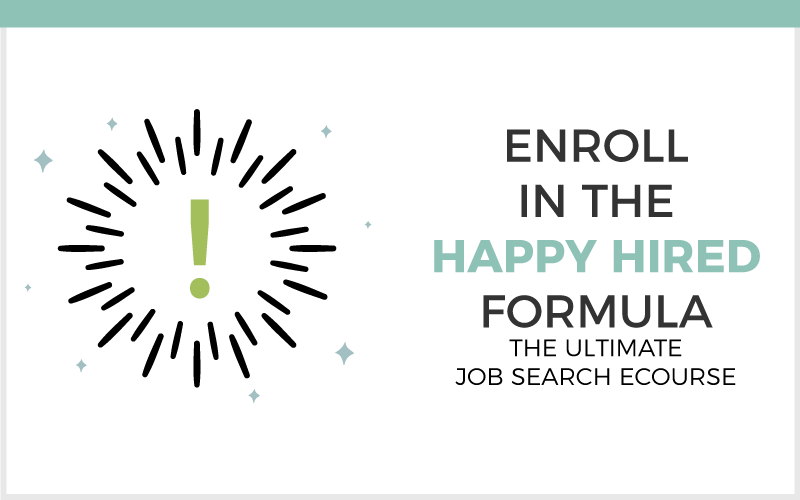After years of working with job seekers, I’ve learned that negative work experiences from toxic work environments or lay-offs can have a tremendously negative impact on job searching. If left unchecked, the trauma from these experiences can even carry over into future roles. This negativity can feel paralyzing, as many people view these toxic experiences as their own fault. They move into blaming, guilting, and shaming themselves. So in this article, I’d like to share some of my favorite tools and exercises on how to recover from a toxic or negative work situation. You can continue to read along, or watch the video below instead.
How to Recover from a Toxic Work Situation
Take time and space to heal from your experience
Every person has a different situation, but many of us often go through what’s called the victim mentality after suffering through a negative situation. This is when we direct all those negative emotions, including pity and anger, towards ourselves. We don’t accept any responsibility for recovering from what happened, and instead, stay stuck in a “woe is me” headspace. Conversely, we might try to immediately think of a solution when facing a problem and just gloss over the pain and trauma we endured. However, the best thing to do when trying to recover from a toxic work environment is to just give yourself some time and space to heal from that traumatic experience. I always advise people to take one step back to get ten steps ahead. This won’t cause you to lose any momentum or energy in your job search but rather, by giving yourself this space and time, you’re going to start attracting the right opportunities and move on a lot faster. Processing and healing from trauma is absolutely crucial if you want to move on from what happened without any residual ill effects.
RELATED: SHOULD I QUIT MY JOB WITHOUT ANOTHER LINED UP?
Honestly reflect on what you could’ve done differently in your situation
The next step is to give yourself an honest assessment of what you want to do or could have done differently. It’s important to understand that we have our own choices, and we have complete control over our responses and our reactions towards anything in life. Past experiences can become a wonderful learning opportunity to take with us in the future.
To continue in your reflection, you might consider asking colleagues for feedback. If you have any coworkers that you really trust, this is the time to ask them for constructive feedback. You can soften up the conversation by sharing something negative about yourself first. Most of the time, people are more apt to share when they see you’ve neutralized the playing field by opening up with your own self-reflection. You might share something like this:
“I’ve been told that I can be quite defensive. I’m trying to figure out what I can do so that I don’t run into the same situation again. Do you have any constructive feedback for me?”
After that, honestly listen to their advice so you can improve the situation moving forward. By acknowledging feedback you’ve already received, it allows the person not to hold anything back and share constructive criticism without being scared of hurting your feelings. This honest feedback can be instrumental in your future development.
RELATED: 3 MINDSET BLOCKS HOLDING YOU BACK IN YOUR CAREER
Reflect on your positive accomplishments and contributions
Now it’s time to move into positive reflection. We naturally tend to place a lot of guilt and blame on ourselves. We’re our own worst critics when in reality, there’s actually so much that we can acknowledge and praise ourselves for. So any time you’re wallowing in self-pity, or you just don’t feel motivated or excited about the journey you’re on, it can be helpful to have a list of positive accomplishments to reflect on. I encourage you to write as many wins you can think of, small or large. Not only will this help you shape up your resume and prepare you for your interviews, but it’ll also help you remember the things you have already achieved.Give yourself permission to lean into your positive accomplishments and attributes, and allow it to move you towards success.
Here are some positive self-reflection questions to ask:
What have I done really well?
What am I really proud of?
How did I positively impact this last organization?
What did I accomplish?
RELATED: DON’T BURN BRIDGES: BUILD A POSITIVE REPUTATION
Remember that your past and present are not your future
It’s really important to understand is that you are in full control of your reactions and your responses. Your past is not your future nor is your present your future. Just because something happened in the past, doesn’t mean it has to happen again. Instead, think about what can you do differently this time so that the same thing doesn’t occur in the future. I just want to emphasize that not every job, opportunity, boss, colleague, or team is going to be the right fit for you. Sometimes you’re going to experience negative situations, so just treat that as a lesson that you can reflect on in the future.
PRO TIP: Use the experience to gain clarity on where a better opportunity might lie
It’s time to start visioning why some things didn’t work for you. Think of the things that you are looking for, and what’s important. Try to be clear about what your next opportunity would really need to have in order for you to thrive and be happy. Decide on what organizational values you are looking for, and what else is missing that you need more of. The more you can list down and visualize the opportunities you have, the more you can start positioning yourself towards your target. Just realizing that you’re in full control of actually achieving and creating your opportunities is such a beautiful thing. So instead of living in the past, ask yourself, how can I start building towards the future?
RELATED: PERSONAL BRAND EXAMPLES: CRAFT YOUR ONE-SENTENCE VISION STATEMENT
Polish and orient your personal brand towards your next target role
Planning for your future is as simple as asking yourself where you are today, and where you’re going to start moving towards. Having that vision in mind is what’s going to get you to where you want and need to be a lot quicker. The fun part is when you start networking and orienting yourself with your personal brand, and just really getting curious about what is out there for you.
If you ever find yourself in a toxic work environment, just know that you are not alone. There is a whole community of people who have experienced something very similar. If you need support or need to speak to a therapist or a career coach, absolutely do so. What’s bottling up inside is never going to get resolved until you’re able to address your thoughts and your feelings head-on. Let me know in the comments below if you have experienced a negative or toxic work environment, and how you overcame it. I’m curious to know! I hope these tips were helpful. Onwards and upwards!
